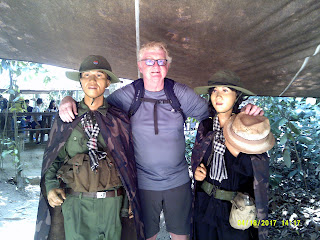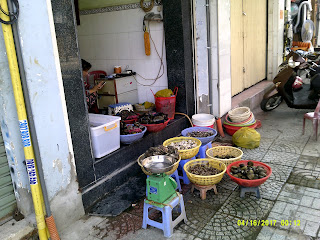I’ll be taking the train north to Hanoi in a couple of days. I am skipping Hue, and will probably regret it, but I have to leave Ho Chi Minh City later than planned because of train schedules, and the only fixed event in my itinerary is a flight from Hanoi to Kunming, which is already booked.
Saigon has 13 million people, and 7.5 million motorcycles. If you have to superficially sum up this city that might be it. For a foreigner, the primary skill you must learn for a short visit is how to cross the street. On the main thoroughfares, waiting for a break in the traffic is pointless. There are traffic lights, but, (with one or two exceptions I have seen) there are no yellow lights and everyone starts about five seconds before the light changes anyway. So you just have to walk in front of the speeding motorcycles, buses, and occasional cars, and never look at the drivers and riders - you can’t hesitate. Hesitation can be fatal. They are timing their moves based on you maintaining a predictable pace and direction. And of course if you can join up with a group, that always seems to give you a better chance of making it to the other side of the road. Saigon is a city you can see most of (for the short 3-5 day visit) on foot.
I don’t want to get too wrapped up in disputable history, but for an American my age, Saigon has a significance that salted ruins of Carthage might have had for a Roman longing for the republic during Augusta’s time, or Moscow might have had for a Frenchman during the Bourbon Restoration of the 1830s; it is the place where everything changed, where it all went wrong. In the fifties we were taught as kids that “America never lost a war” and never would because our heart was pure and intentions were noble. We were told so many lies about Vietnam in the early sixties, and the costs of those lies were 55,000 dead Americans, maybe three million dead Vietnamese. American society that has not been the same since. As Faulkner said, “The past is never dead. It isn’t even the past.”
The first morning after I arrived I went walking. The outside of Saigon proper, it is a commercial city, with little family-owned factories and warehouses, but the city itself is small, and like Portland Oregon, it is the junction of a couple of rivers.
It was Easter Sunday and I had no plan for my first day. Strangely I wasn’t too jet lagged, but I think I did sleep some on the plane during the 25 hour trip from Portland. On the street in Saigon it was over 100⁰ F so after coffee and some great pastry, (as befitting a former French colony) I went looking for some sunscreen. The entire city seems like a giant kiosk/bodega, which seemed to follow neighborhood patterns - some blocks everybody sells plumbing supplies, other shoes, etc. But I found my way to a street with lots of travel agencies, and eventually found some.
My Dad loved Saigon, he was a merchant seaman (Chief Engineer) and was over here a number of times during the Vietnam War, making big money for the time bringing ammo (double hazard pay mostly to Da Nang) and other stuff. “Wide open” he used to say, but as I searched my memory of his stories all I remembered specifically was the long trip up the river to the city with jungle on both sides, from where the Viet Cong never fired on the ships. He said that in return, a certain percentage of the supplies were guaranteed to Charlie. I have no way of knowing if that was true.
I remember when I was in high school, and was much more conservative in my political outlook than I am now, I asked him if we were winning. I remember we had at least one guy from our high school who died over there, and several more were on there way, while several from my class soon would be. Anyway, he said we were getting beat, and would never ever win there. He drank with officers and soldiers in Da Nang and they told him horror stories of whole platoons getting wiped out. He didn’t want me anywhere near the place, and gave me some sage advice as to how to go to the end of the draft line at the end of the year (“Drop your deferment” he said just before Christmas, 1969, so my low (50 something) draft number would be before the following years crop of cannon fodder.) At the time my grades freshman year in college didn’t bode well for a long stay in academia.
The following spring was Cambodia and Kent State and I did my best to express my discontent with American actions and policy, (recorded elsewhere). That Spring 1970 semester ended early and we all got passing grades (so we would have leave sleepy Lawrence Kansas for summer break before we burnt it down). So you can say that the war ensured I would I make it through the first year of college.
Anyway, Dad told me he loved Saigon and its beautiful the women in their slit skirts, and the easy-going colonial, tropical atmosphere, even during the war. He said he just missed being blown up after leaving a floating bar in the middle of the river by a few minutes, but I have never been able to confirm when or how that happened.
So, I was craving shade, and found a little park with some big trees, and a place to sit. What I would subsequently discover that as an older western man, walking in a park, a market or near a museum, that there would be many old Vietnamese men with well practiced self introductions. I was called over by an old man sitting on a bench.
“Hey, come, I show you!” It was my first morning of my first day in Saigon. “You fight in 1973? What outfit?”
No, I was a student. Protest.” I pantomimed waving a sign.
He smiles. “Good. No more war. We all live in peace. Americans the best. Here look! This was me.”
He shows me a picture of a young man maybe mid-30s. He had a mustache and reminded me of Colonel Ky, the “dashing” South Vietnamese Air Force Colonel who was in power for a while in 1967 or so. I think I remember he ended up running a liquor store in Miami.
“Henry Cabot Lodge!” It took him a few tries saying it before I understood. “1955, I work for Colonel P- (French). Then Westmoreland. I run the motor pool for Westmoreland. Chevrolet.”
“What’s your name?” I interrupted.
“Toch Dey,” I think he said. He goes off with some French words I don’t understand. “No money, no pussy!” He cackles. “Sucky fucky. How old are you?”
“65.”
“So young! I am 87. Here look.” He has some postcards -
“1974 - Vietminh come. 1968 - Blow up embassy. Here take postcards.
I took them. “How much?”
“American dollars? Not much.”
I hand him two. “Enough?”
“Maybe more. My wife needs medicine.” I give him two more.
“You be careful - They steal your money.”
Later another one, closer to my age, comes up on motorcycle. He pointed at the back. “Get on, Let’s go, I take you. Very safe.”
No, I say, I want to walk, remembering Toch Dey’s warning.
“Look!” He shows me a leather bound notebook, lot’s of testimonials from satisfied Americans.
“I need the exercise.”
“No, no, I’ll show you.” I shake my head. “You fight?” he asked.
“No. Student.” I do my sign waving dance.
He frowns. “This government treats my family very badly.” Still he persists. “I take you to war museum.” I shake my head and walk away.
A guy offers me a coconut with a straw. “How much?”
“1,2,3”
“What?”
“He cuts the coconut. “50,000.”
“What?” I go to walk away. He pouts, because he has ruined a coconut for me. I relent, give him the 50,000 dong. (a little over $2, outrageous!)
Not many people smoke here, which is pretty cool. Cigarettes are available, but it appears to be an open black market. Everyone wears a helmet when riding a motorcycle. (except for the little children riding on the gastank.)
Anyway here are some pictures.
































































